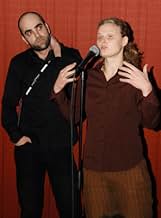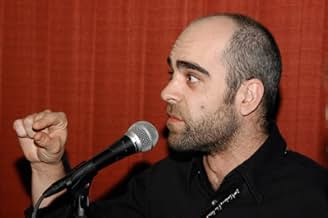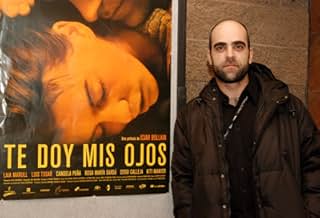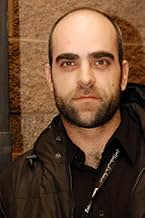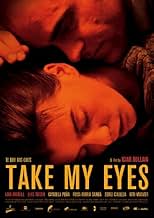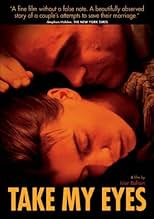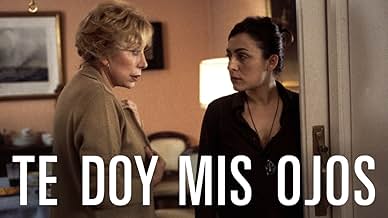PUNTUACIÓN EN IMDb
7,4/10
7,8 mil
TU PUNTUACIÓN
Pilar huye de casa una noche de invierno. Solo se lleva con ella unas pocas pertenencias y a su hijo, Juan. Antonio no tarda en empezar a buscarla. Dice que Pilar es su sol y que, además, "l... Leer todoPilar huye de casa una noche de invierno. Solo se lleva con ella unas pocas pertenencias y a su hijo, Juan. Antonio no tarda en empezar a buscarla. Dice que Pilar es su sol y que, además, "le ha dado sus ojos...".Pilar huye de casa una noche de invierno. Solo se lleva con ella unas pocas pertenencias y a su hijo, Juan. Antonio no tarda en empezar a buscarla. Dice que Pilar es su sol y que, además, "le ha dado sus ojos...".
- Dirección
- Guión
- Reparto principal
- Premios
- 42 premios y 17 nominaciones en total
Rosa Maria Sardà
- Aurora
- (as Rosa María Sardá)
Kiti Mánver
- Rosa
- (as Kiti Manver)
David Mooney
- John
- (as Dave Mooney)
Reseñas destacadas
"Take My Eyes (Te doy mis ojos)" is a frank, classy woman in jeopardy/Lifetime TV for Women film.
A couple of elements raise it above Hollywood's unfortunately already tired treatment of abused wives in such films as "Sleeping with the Enemy" or "Enough", among many others.
First is the superb acting by Laia Marull as "Pilar". Her transformation from frightened mouse to tentative independent to an expressive person with a back bone is riveting. She does look distractingly like Annabella Sciorra, but that means she is beautiful and very womanly.
Second is the emphasis less on the physical violence by an abuser that American films revel in (this film opens right after such an incident) than on the psychological impact, both on abuser and victim. Even amidst strife, this is a passionate couple who were very much in love, though we get hints from the beginning that he was controlling, as in the conversations that include the titular phrase. Unlike Hollywood, her final revenge is not violent but in how she uses those words back at him.
Uniquely, we see the husband (Luis Tosar as "Antonio" looking distractingly like the Irish actor James Nesbitt) as a 360 degree person, with his own family stresses, and not just as the usual evil incarnate. Though we don't see how he got into anger-management therapy sessions for abusers that in the U.S. are usually only a result of a court-order and I couldn't tell from the untranslated credits what experts were consulted for these recreations, they are a fascinating look at an attempt to change abusive behaviors. The shrink finds he has to teach these guys even how to have a conversation with their wives to prevent triggers, let alone what to do when rage starts filling their heads.
Another difference is that while the husband jealously fixates on the possibility of her finding a new lover, a sensitive new age guy character invariably appears in the Hollywood versions (and it was entertainingly non-stereotypical that the Scottish brother-in-law is held up as a prized alternative), the threat to his marriage actually comes from her relationships with the women in her life, from family to friends. Through them she becomes more attuned to humiliation as violence than even her hospital records filled with lied about fractures. It was a bit much symbolically to have her suddenly get into artistic presentations of ancient sexy myths, though it was nice that the credits identified each of the paintings discussed.
While sadly this is a familiar story in filmed outline, the film is continually suspenseful and involving as to what they will do, together and apart.
A couple of elements raise it above Hollywood's unfortunately already tired treatment of abused wives in such films as "Sleeping with the Enemy" or "Enough", among many others.
First is the superb acting by Laia Marull as "Pilar". Her transformation from frightened mouse to tentative independent to an expressive person with a back bone is riveting. She does look distractingly like Annabella Sciorra, but that means she is beautiful and very womanly.
Second is the emphasis less on the physical violence by an abuser that American films revel in (this film opens right after such an incident) than on the psychological impact, both on abuser and victim. Even amidst strife, this is a passionate couple who were very much in love, though we get hints from the beginning that he was controlling, as in the conversations that include the titular phrase. Unlike Hollywood, her final revenge is not violent but in how she uses those words back at him.
Uniquely, we see the husband (Luis Tosar as "Antonio" looking distractingly like the Irish actor James Nesbitt) as a 360 degree person, with his own family stresses, and not just as the usual evil incarnate. Though we don't see how he got into anger-management therapy sessions for abusers that in the U.S. are usually only a result of a court-order and I couldn't tell from the untranslated credits what experts were consulted for these recreations, they are a fascinating look at an attempt to change abusive behaviors. The shrink finds he has to teach these guys even how to have a conversation with their wives to prevent triggers, let alone what to do when rage starts filling their heads.
Another difference is that while the husband jealously fixates on the possibility of her finding a new lover, a sensitive new age guy character invariably appears in the Hollywood versions (and it was entertainingly non-stereotypical that the Scottish brother-in-law is held up as a prized alternative), the threat to his marriage actually comes from her relationships with the women in her life, from family to friends. Through them she becomes more attuned to humiliation as violence than even her hospital records filled with lied about fractures. It was a bit much symbolically to have her suddenly get into artistic presentations of ancient sexy myths, though it was nice that the credits identified each of the paintings discussed.
While sadly this is a familiar story in filmed outline, the film is continually suspenseful and involving as to what they will do, together and apart.
From beginning to end this movie is a sea of tension, mostly generated by Pilar's (Laia Marull) stunning fear gestures, and by Antonio's (Luis Tosar) volatile state, leaving the spectators breathing heavily in awe.
With great performances by the entire cast, a solid and incredibly realistic script, an amazing score, and shot in the beautiful town of Toledo, this production grabs you right from the start. Even when the story isn't as disturbing as 'Once Were Warriors (1994)' the characters develop a three dimensional presence to the point of being as complex as a real couple in a self-destructive relationship creating such a drama, that tends to be more psychological than physical.
And even when the conclusion does not represent a drastic overcome, it stands as an example of courage and self determination that will, in deed, prevail in the mind of the viewer, and even more in those who find themselves in the same situation as the protagonist. Kudos to Miss Bollain, this is a good movie, be sure not to miss it.
With great performances by the entire cast, a solid and incredibly realistic script, an amazing score, and shot in the beautiful town of Toledo, this production grabs you right from the start. Even when the story isn't as disturbing as 'Once Were Warriors (1994)' the characters develop a three dimensional presence to the point of being as complex as a real couple in a self-destructive relationship creating such a drama, that tends to be more psychological than physical.
And even when the conclusion does not represent a drastic overcome, it stands as an example of courage and self determination that will, in deed, prevail in the mind of the viewer, and even more in those who find themselves in the same situation as the protagonist. Kudos to Miss Bollain, this is a good movie, be sure not to miss it.
This is an excellent movie that understands the complexity of domestic violence. I am an advocate for survivors of domestic violence and we know that partner abuse is much more than a black eye. During the movie there is only one episode of physical violence, however we can observe throughout the movie the dynamics of power and control by the husband, through emotional, verbal, and other types of abuse. The person who wrote the previous message shows a complete lack of understanding about the impact that domestic violence has on the victim, why it is so difficult to break with cycle, the challenges that women face when they try to leave (including the fear of retaliation). Don't forget that 75% of women killed by their partners were murdered after they left the relationship. By leaving, women are taking a great risk. I think this movie is very realistic and the actors do a great job. I highly recommend it.
Writer-director Iciar Bollaín's film, TAKE MY EYES (Spain 2003) is full of boldness and nuance, approaching 'full frontal' (almost a pun here) the delicate 'taboo' subject on spouse abuse in love and marriage. The exceptionally talented and selfless portrayal of the couple by Laia Marull as Pilar (the young wife/mother) and Luis Tosa as Antonio (the husband/abuser) made their scenes together - both the tender moments and violent events, convincing and complete. It's heartbreaking to see these two people who could be so in love (felt through the intimate lovemaking scenes, the calm moments they enjoy each other by the river) yet juxtaposed by the traumatic turn of events (seen through the 'explosive' frightful situations). Bollaín, with Marull and Tosa, did not shy away from the volatile subject and key scenes - it is no doubt devastating to behold yet the impact of the situation is truly felt and may also leave us shaking. Kudos to such giving and fearless performances and production decisions.
The Toledo, Spain, locales (especially by the river and bridge) seen in the film are as beautiful as I visited in Fall 2003. I remember the museum where Antonio waited outside for Pilar. He tried. He wanted to be a loving husband to her, but he couldn't help himself. It almost seem like uncontrollable 'alcoholic dependency', his jealous rage generated from fear of losing Pilar, whom he believes he loves in his own possessive ways. While Pilar also tries. She practically loses herself in trying to please Antonio and be 'blinded' by his waves of tenderness towards her. She's struggling to be a good wife and responsible mother to their little boy. She's also trying to find herself through the process.
I recall the wisdom from poet Kahlil Gibran's book "The Prophet" on Marriage: yes, you shall be together forever more, but there should be spaces in your togetherness. "Give your hearts, but not into each other's keeping. For only the hand of Life can contain your hearts." And on Love, that it does not possesses, Gibran said: "And think not you can direct the course of love, for love, if it finds you worthy, directs your course."
TAKE MY EYES gives us a rare chance to observe closely the various aspects/perspectives of a domestic violence situation, and offering viable option on the part of the woman. It may not be an easy film to watch due to frank emotional depiction, but it is superbly delivered by a fantastic cast besides Marull and Tosa. The script, co-written by Bollaín and Alicia Luna, contains supporting storyline (including a wedding and Scottish bagpipes and kilts - cultural diversity, girl talk, men talk, laughs and heartaches). Production is excellent in every respect: cinematography, editing, art direction, music score, sound and all. Highly recommend this film, with no hesitation.
The Toledo, Spain, locales (especially by the river and bridge) seen in the film are as beautiful as I visited in Fall 2003. I remember the museum where Antonio waited outside for Pilar. He tried. He wanted to be a loving husband to her, but he couldn't help himself. It almost seem like uncontrollable 'alcoholic dependency', his jealous rage generated from fear of losing Pilar, whom he believes he loves in his own possessive ways. While Pilar also tries. She practically loses herself in trying to please Antonio and be 'blinded' by his waves of tenderness towards her. She's struggling to be a good wife and responsible mother to their little boy. She's also trying to find herself through the process.
I recall the wisdom from poet Kahlil Gibran's book "The Prophet" on Marriage: yes, you shall be together forever more, but there should be spaces in your togetherness. "Give your hearts, but not into each other's keeping. For only the hand of Life can contain your hearts." And on Love, that it does not possesses, Gibran said: "And think not you can direct the course of love, for love, if it finds you worthy, directs your course."
TAKE MY EYES gives us a rare chance to observe closely the various aspects/perspectives of a domestic violence situation, and offering viable option on the part of the woman. It may not be an easy film to watch due to frank emotional depiction, but it is superbly delivered by a fantastic cast besides Marull and Tosa. The script, co-written by Bollaín and Alicia Luna, contains supporting storyline (including a wedding and Scottish bagpipes and kilts - cultural diversity, girl talk, men talk, laughs and heartaches). Production is excellent in every respect: cinematography, editing, art direction, music score, sound and all. Highly recommend this film, with no hesitation.
At the rate of more than one a week we have on our headlines a case of a woman being killed by her husband, ex-husband, partner or just simply lover, and even, very occasionally vice-versa. The fact that most of these crimes are committed in a very defined area of Spain is something which suggests the sociologists should be working flat out in an attempt to inform the politicians why this is happening - not that our elected representatives are likely to do anything to remedy the situation. Already, this year alone, 66 Spanish women have been beaten and killed by their partners in life. The other day I read that a lady judge had quashed a case of wife-battering because 'it was only an isolated case without continuity', or words to that effect. A lady judge .........! Evidently our legal and social systems need a drastic overhaul. And that means trying to inject a goodly dosis of common sense in both systems.
The Icíar Bollaín-Santiago García de Leániz tandem, forming Iguana Films, has clearly established that human contact stories are their main motivation, as in 'Flores de Otro Mundo' (qv); and in 'Te Doy Mis Ojos' they do not simply follow the line, but improve on it explosively. Somewhat akin to better known films by the British directors Ken Loach and David Lynch, basically for the sociological aspects in themselves, but clearly hallmarked as inherently Spanish in content and realisation, as is the case with Fernando León de Aranoa's 'Los Lunes al Sol' (qv), to name but one recent example of a film with a real human and sociological content, 'Te Doy Mis Ojos' competes with the best of the genre.
With this new film, the 'Iguana' tandem fall back on Luis Tosar again, and present us with Laia Marull. This actress had not come to my attention previously, as she seems to have done things for film or TV mostly confined to her native Catalonia. A welcome presence is Rosa María Sardà who has often pleased me with her interpretations in several productions. (Why she has to make silly advertisements for TV is totally beyond me). To say that Laia Marull in this film is magnificent is somewhat understating the reality: her performance is so close to absolute perfection, pure real emotions, that even the muscles in her cheeks and neck portray her feelings, as you will rarely ever see in any actress anywhere, however many Oscars they may have stacked away in their wardrobes, exhibited in gilt-framed glass cabinets, or just simply shoved in a corner behind the salt-pot in the kitchen. Laia Marull carries out a 'tour de force' which leaves you open-mouthed in admiration: her reading of the part is superb, such that the spectator is just simply left spell-bound. I thought this kind of acting was only possible in the best Russian tradition, or, if you push me, in some better British productions.
And Luis Tosar is not far behind. Without overplaying his difficult role of a husband, who is, to say the least, a bit off his rocker, and has to mistreat his wife and at the same time maintain the explicit idea that he is just about as sane as you, I, or anybody else, and thus is capable of tenderness, might seem to be asking any actor to overstretch his possibilities. If Luis Tosar was good - very good - in 'Los Lunes al Sol', here in 'Te Doy Mis Ojos' he was even better. These two, then, worked to make this film, evidencing good chemistry, but especially with the film's director, Icíar Bollaín. The result is electrifying, passionate, growling to the most abysmal depths, but reaching great heights in building upon human emotions - real emotions and feelings, not the canned ready-made ephimeral substantiations served up as if for dinner in a four-star restaurant.
The film is architecturally built on a very serious, tragic and dramatic situation; however, there are those lighter moments which can even produce a few teary-eyed guffaws. This is another point where the film scores highly: the timing is absolutely brilliant. In the kids' birthday party there is a brief, grim scene, suddenly interrupted by the appearance of an aunt holding aloft the candled birthday cake with that typically silly smiling grin of any ordinary woman present at such festivities, but with such perfect synchronisation that the audience barely staggers out of the charged tense atmosphere and into the more frivolous, before being thrown back into the grimmer parts of the story-line which pervades the film.
Because it is the stark reality of thousands of married women in Spain that is the basis of the film: badly- treated, beaten and abused, barely five per cent ever get to a police-station or to a court of law. This is the message in this hard, direct film that delves deeply into real human situations which cannot - should not - be simply left in the statistics of bureaucratic ledgers, as happens these days.
'Te Doy Mis Ojos' is a beautiful, tragic, moving real-life story; if in itself it must rank among the best seven or eight Spanish films I have ever seen - and believe me I have seen many - there is something which towers above the film itself - Laia Marull has achieved something nearing the impossible; and Icíar Bollaín has aided and abetted her to produce a final result that can only drive you at the end to give this film a standing ovation.
The Icíar Bollaín-Santiago García de Leániz tandem, forming Iguana Films, has clearly established that human contact stories are their main motivation, as in 'Flores de Otro Mundo' (qv); and in 'Te Doy Mis Ojos' they do not simply follow the line, but improve on it explosively. Somewhat akin to better known films by the British directors Ken Loach and David Lynch, basically for the sociological aspects in themselves, but clearly hallmarked as inherently Spanish in content and realisation, as is the case with Fernando León de Aranoa's 'Los Lunes al Sol' (qv), to name but one recent example of a film with a real human and sociological content, 'Te Doy Mis Ojos' competes with the best of the genre.
With this new film, the 'Iguana' tandem fall back on Luis Tosar again, and present us with Laia Marull. This actress had not come to my attention previously, as she seems to have done things for film or TV mostly confined to her native Catalonia. A welcome presence is Rosa María Sardà who has often pleased me with her interpretations in several productions. (Why she has to make silly advertisements for TV is totally beyond me). To say that Laia Marull in this film is magnificent is somewhat understating the reality: her performance is so close to absolute perfection, pure real emotions, that even the muscles in her cheeks and neck portray her feelings, as you will rarely ever see in any actress anywhere, however many Oscars they may have stacked away in their wardrobes, exhibited in gilt-framed glass cabinets, or just simply shoved in a corner behind the salt-pot in the kitchen. Laia Marull carries out a 'tour de force' which leaves you open-mouthed in admiration: her reading of the part is superb, such that the spectator is just simply left spell-bound. I thought this kind of acting was only possible in the best Russian tradition, or, if you push me, in some better British productions.
And Luis Tosar is not far behind. Without overplaying his difficult role of a husband, who is, to say the least, a bit off his rocker, and has to mistreat his wife and at the same time maintain the explicit idea that he is just about as sane as you, I, or anybody else, and thus is capable of tenderness, might seem to be asking any actor to overstretch his possibilities. If Luis Tosar was good - very good - in 'Los Lunes al Sol', here in 'Te Doy Mis Ojos' he was even better. These two, then, worked to make this film, evidencing good chemistry, but especially with the film's director, Icíar Bollaín. The result is electrifying, passionate, growling to the most abysmal depths, but reaching great heights in building upon human emotions - real emotions and feelings, not the canned ready-made ephimeral substantiations served up as if for dinner in a four-star restaurant.
The film is architecturally built on a very serious, tragic and dramatic situation; however, there are those lighter moments which can even produce a few teary-eyed guffaws. This is another point where the film scores highly: the timing is absolutely brilliant. In the kids' birthday party there is a brief, grim scene, suddenly interrupted by the appearance of an aunt holding aloft the candled birthday cake with that typically silly smiling grin of any ordinary woman present at such festivities, but with such perfect synchronisation that the audience barely staggers out of the charged tense atmosphere and into the more frivolous, before being thrown back into the grimmer parts of the story-line which pervades the film.
Because it is the stark reality of thousands of married women in Spain that is the basis of the film: badly- treated, beaten and abused, barely five per cent ever get to a police-station or to a court of law. This is the message in this hard, direct film that delves deeply into real human situations which cannot - should not - be simply left in the statistics of bureaucratic ledgers, as happens these days.
'Te Doy Mis Ojos' is a beautiful, tragic, moving real-life story; if in itself it must rank among the best seven or eight Spanish films I have ever seen - and believe me I have seen many - there is something which towers above the film itself - Laia Marull has achieved something nearing the impossible; and Icíar Bollaín has aided and abetted her to produce a final result that can only drive you at the end to give this film a standing ovation.
¿Sabías que...?
- CuriosidadesLaia Marull said her role in this film is the one that has marked her career the most. "It was a very intense movie. I remember the scene in which my character is undressed by his partner and urinates on the balcony. It was a very emotional scene. Working with Luis Tosar is very easy because you look into his eyes and he gives you everything," Marull said. For his part, Tosar revealed a secret about that scene: "When we filmed the scene on the balcony, in which she pees on herself out of fear, I remember being with a sponge between her legs, helping her squeeze it so that the trickle would fall out."
- ConexionesReferenced in Spanish Movie (2009)
- Banda sonoraFarewell To Gibraltar
Canción popular escocesa
Selecciones populares
Inicia sesión para calificar y añadir a tu lista para recibir recomendaciones personalizadas
- How long is Take My Eyes?Con tecnología de Alexa
Detalles
- Fecha de lanzamiento
- País de origen
- Sitio oficial
- Idioma
- Títulos en diferentes países
- Take My Eyes
- Localizaciones del rodaje
- Empresas productoras
- Ver más compañías en los créditos en IMDbPro
Taquilla
- Recaudación en Estados Unidos y Canadá
- 30.496 US$
- Fin de semana de estreno en EE. UU. y Canadá
- 6440 US$
- 19 mar 2006
- Recaudación en todo el mundo
- 6.098.633 US$
- Duración
- 1h 49min(109 min)
- Color
- Mezcla de sonido
- Relación de aspecto
- 1.85 : 1
Contribuir a esta página
Sugerir un cambio o añadir el contenido que falta

![Tráiler [OVS]](https://m.media-amazon.com/images/M/MV5BNDFiNzRhYTMtODVmNy00OWQ0LTkwMzAtYjRiNGZmNTk4YjhhXkEyXkFqcGdeQXRyYW5zY29kZS13b3JrZmxvdw@@._V1_QL75_UX500_CR0)
